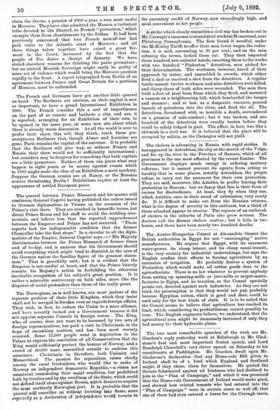The Austro-Hungarian Consul at Alexandria blames the- British authorities in
Egypt for not " encouraging " native manufactures. He argues that Egypt, with its enormous. water-power, its cheap labour, and its cheap canal-transit, is the very country for industrial undertakings, but says the English confine their efforts to forcing agriculture by an extension of irrigation. He probably desires a system of Protection which would make all cotton goods dear to the agriculturists. There is no law whatever to prevent anybody from setting up spinning-mills or jute-mills or carpet-manu- factories in Egypt, and no taxation, as the Consul specially points out, directed against such industries. As they are not tried, the presumption is that they would not pay, probably because Egyptian cotton, which is good and dear, could be used only for the best kinds of cloth. It is to be noted that the Consul seems to believe that agriculture has reached its. limit, which, considering its profitableness, cannot possibly be true. The English engineers believe, we understand, that the agricultural area might be immensely increased if only they had money for their hydraulic plans.


















































 Previous page
Previous page